Clauses - Overview
1/27
There's no tags or description
Looks like no tags are added yet.
Name | Mastery | Learn | Test | Matching | Spaced | Call with Kai |
|---|
No analytics yet
Send a link to your students to track their progress
28 Terms
Relative Clauses
Uses a relative pronoun to link the clauses together.
e.g. “Filii, qui praeclari erant, post currum ierunt.”
The sons, who were famous, went behind the charriot.
Indirect Question
b. Indirect Questions
Use an interrogative word (e.g., quid, cur, ubi) with a subjunctive verb.
Example:
Nesciebat cur captivi plaustra sequerentur.
“He didn’t know why the captives were following the wagons.”
Indirect Statement
c. Indirect Statements (Oratio Obliqua)
Use accusative + infinitive after a verb of thinking, saying, perceiving, or knowing.
Example:
Scio Paulum triumphavisse.
“I know that Paulus has triumphed.”
Purpose Clause
Explain why something is done. Usually introduced by ut (positive) or ne (negative), with a subjunctive verb.
Example:
Filii venerunt ut curru veherentur.
“The sons came to be carried in the chariot.”
Result Clause
Show the result of the main clause. Introduced by ut, with a subjunctive verb. Often triggered by tam, tantus, adeo, tot, ita, talis in the main clause.
Example:
Tanta erat gloria ut omnes laetarentur.
“The glory was so great that everyone rejoiced.”
Cum Clause
Can be temporal, causal, or concessive, usually with subjunctive.
Temporal:
Cum Paulus triumpharet, populus clamavit.
“When Paulus was triumphing, the people shouted.”Causal:
Cum hostes timerent, fugerunt.
“Since the enemies were afraid, they fled.”Concessive:
Cum vinceretur, tamen pugnavit.
“Although he was being defeated, he still fought.”
Conditional Clause
Use si (if) or nisi (unless). Tense and mood depend on the type:
Real present/future:
Si venit, gaudeo. – “If he comes, I rejoice.”Unreal present:
Si veniret, gauderem. – “If he were coming, I would rejoice.”Unreal past:
Si venisset, gavisus essem. – “If he had come, I would have rejoiced.”
Temporal Clause
Establishes the relationship of time:
Use si (if) or nisi (unless). Tense and mood depend on the type:
Real present/future:
Si venit, gaudeo. – “If he comes, I rejoice.”Unreal present:
Si veniret, gauderem. – “If he were coming, I would rejoice.”Unreal past:
Si venisset, gavisus essem. – “If he had come, I would have rejoiced.”
Sequences Of Tenses
If main clause verb is present, imperative, future or “with have” - present tense, the ut/ne clause is in present tense subjunctive
If main clause is in past tense, ut/ne clause is in imperfect subjunctive
e.g. I come so that I can help you (present tense subj)
e.g. We came so that we might help you (imp)
When “ut” is used in indicative
is translated - “as” or “when”
e.g. Horatius est ingeniosus vir, ut dicunt
Horatius is a very clever man, as they say
Fearing Clause
Uses “ne” to express the action - no negation of the action
Uses a verb of fearing (timeo, timere – “to fear”
vereor, vereri – “to fear / to respect”
metuo, metuere – “to fear / dread)
Purpose Clause (relative pronoun)
Can have “qui/quae/quod” instead of ut - signposted by subjunctive verb
The relative pronoun refers back to the subjunctive, but expresses purpose
What is the intention?
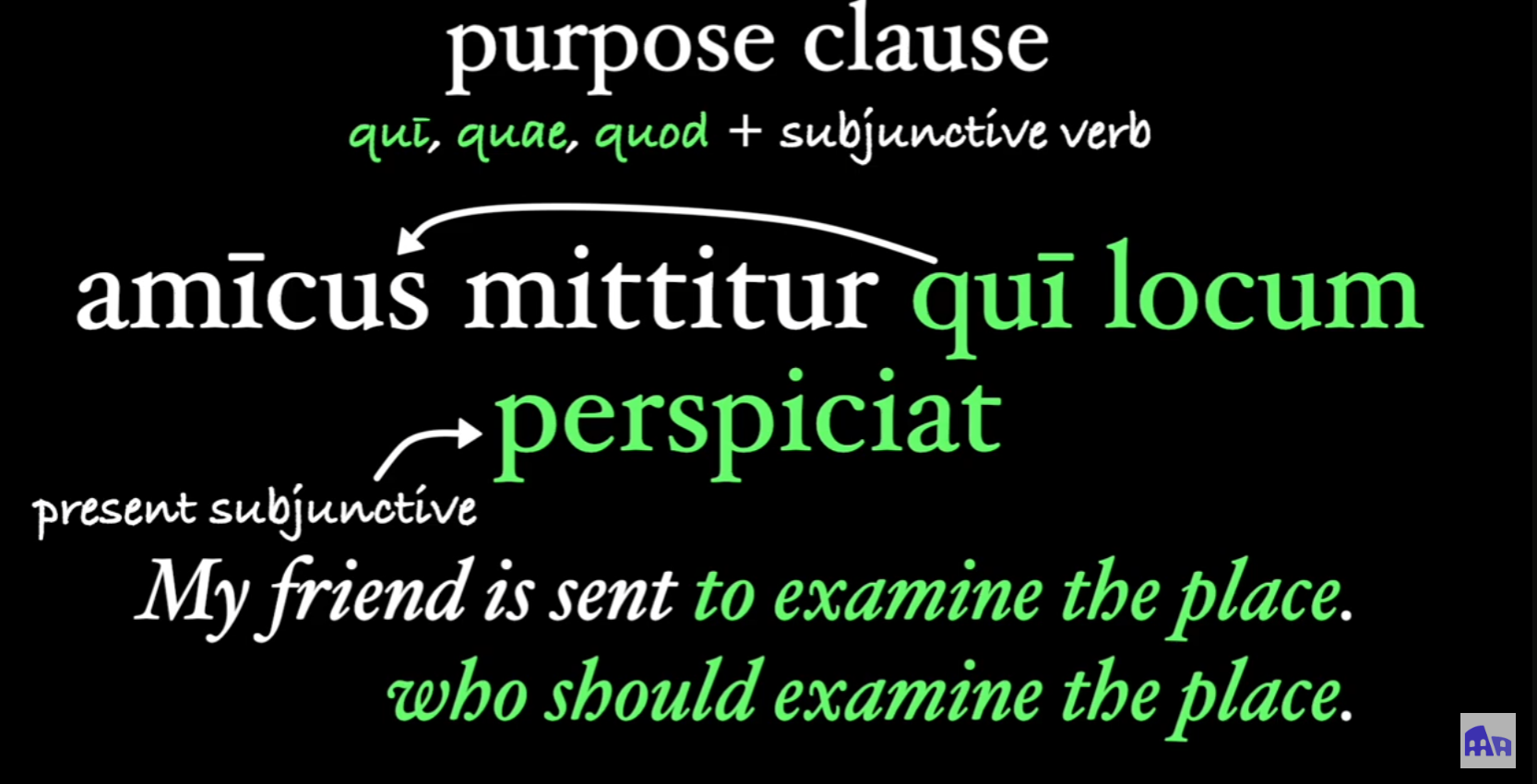
Purpose clause (ubi)
Can have “ubi” instead of ut - signposted by subjunctive verb
E.g. - shows the intended action of sitting, and states that he is looking
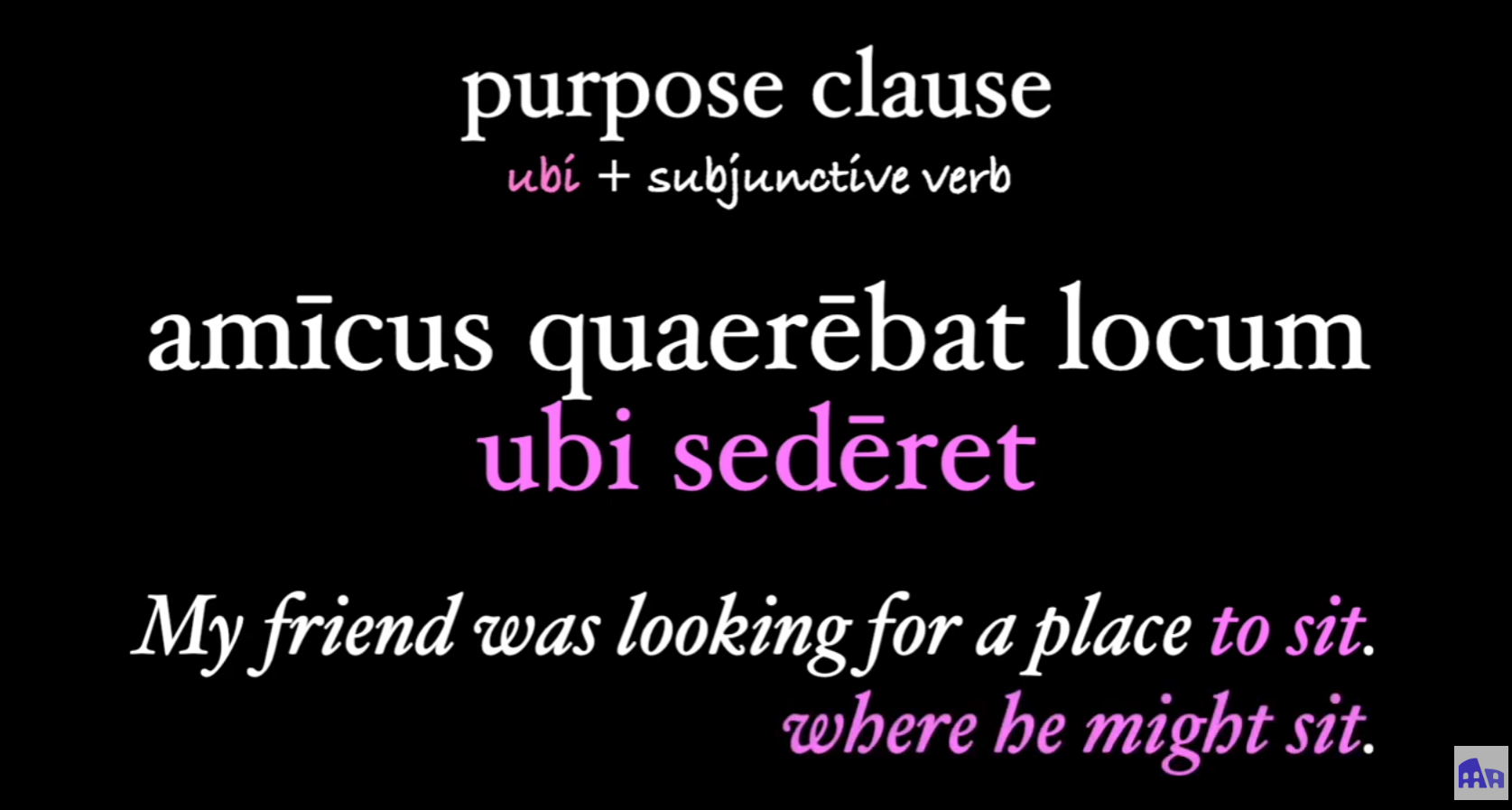
Result Clauses
Signposted by an intensifier
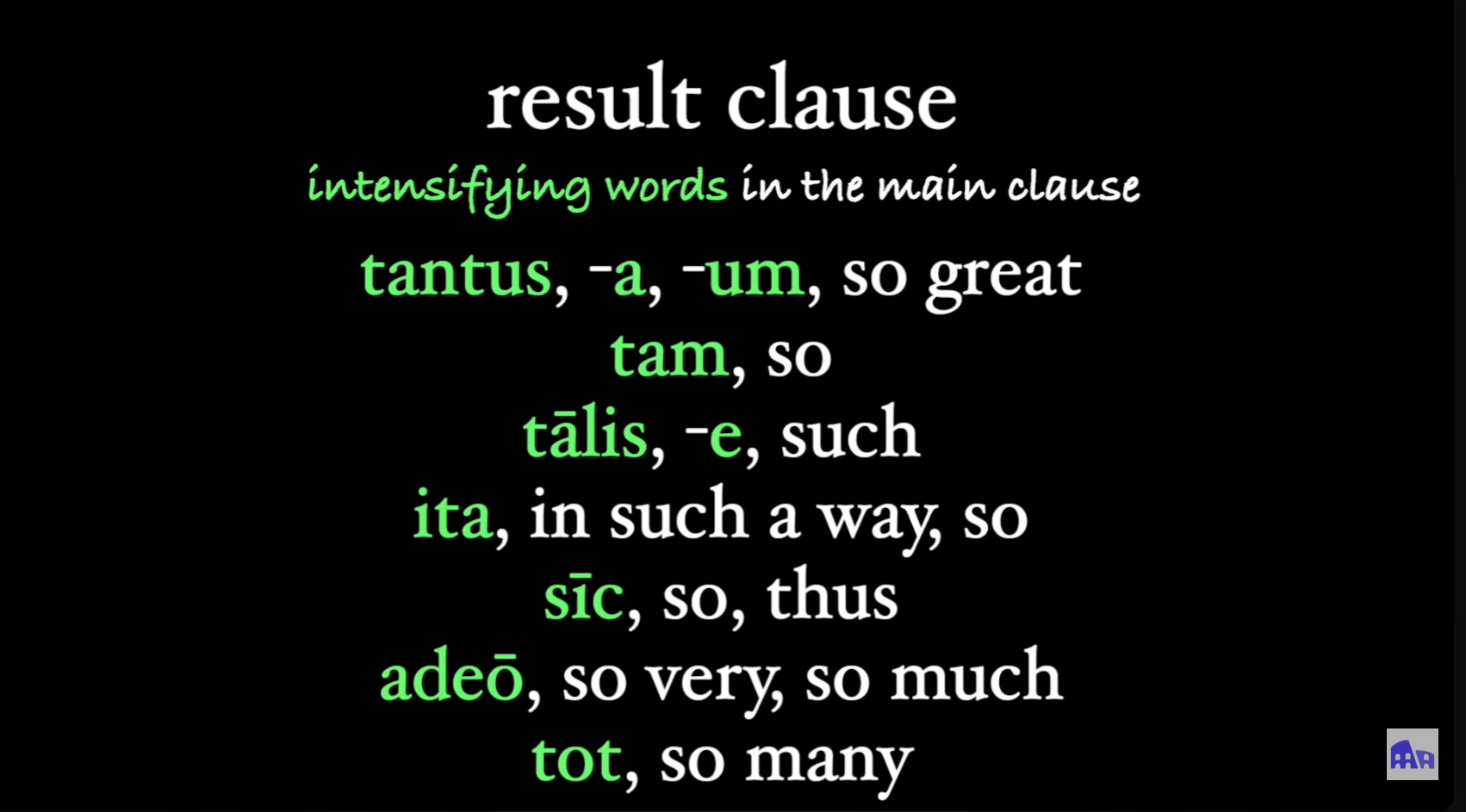
Result clauses (struture)
Intensifier + subjunctive (can also have relative pronoun as well
What is happened as a result of the action?
Purpose Vs Result Clauses
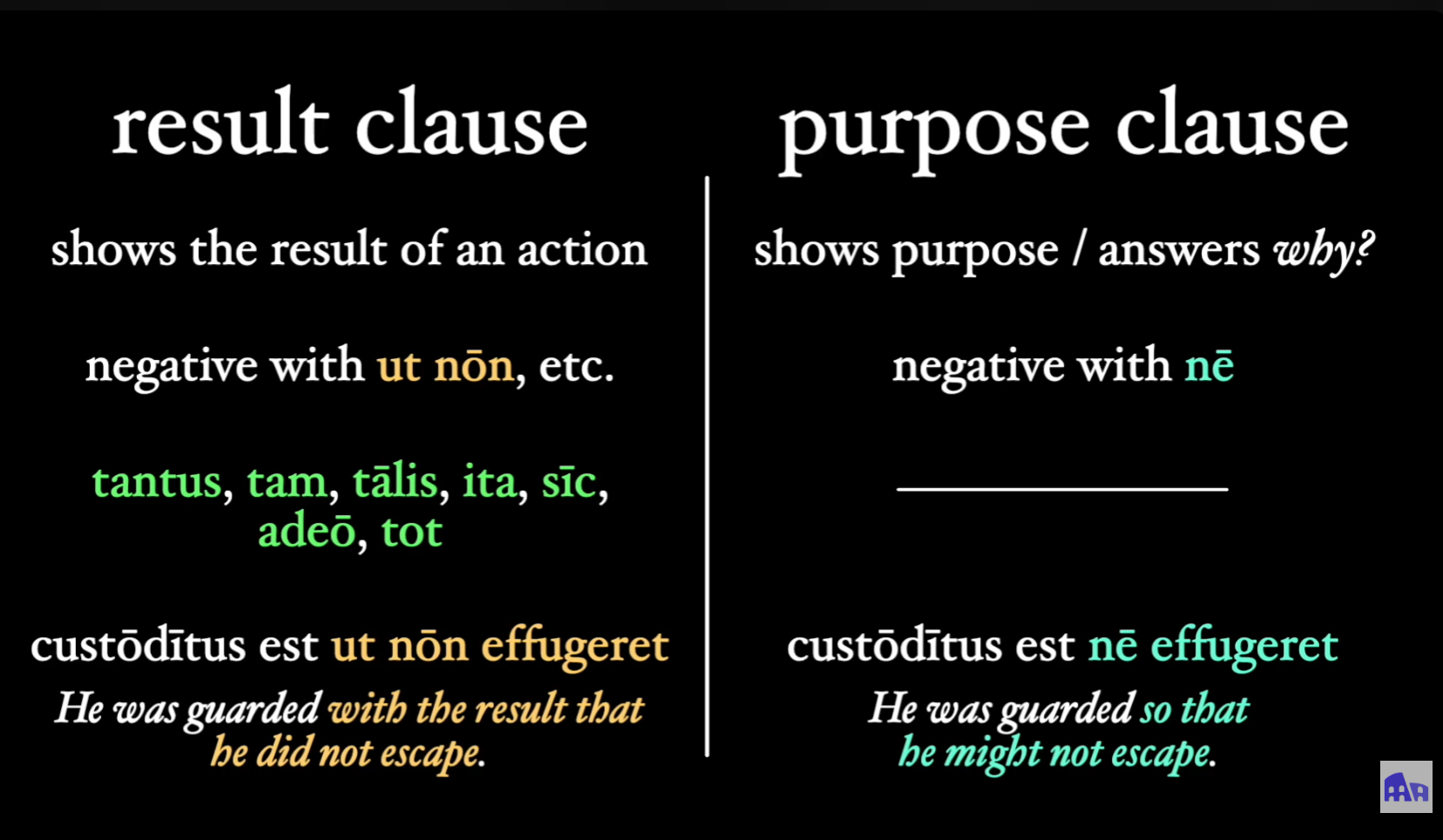
Causal Clause
Shows the reason why something has occured
Causal Clause (Markers
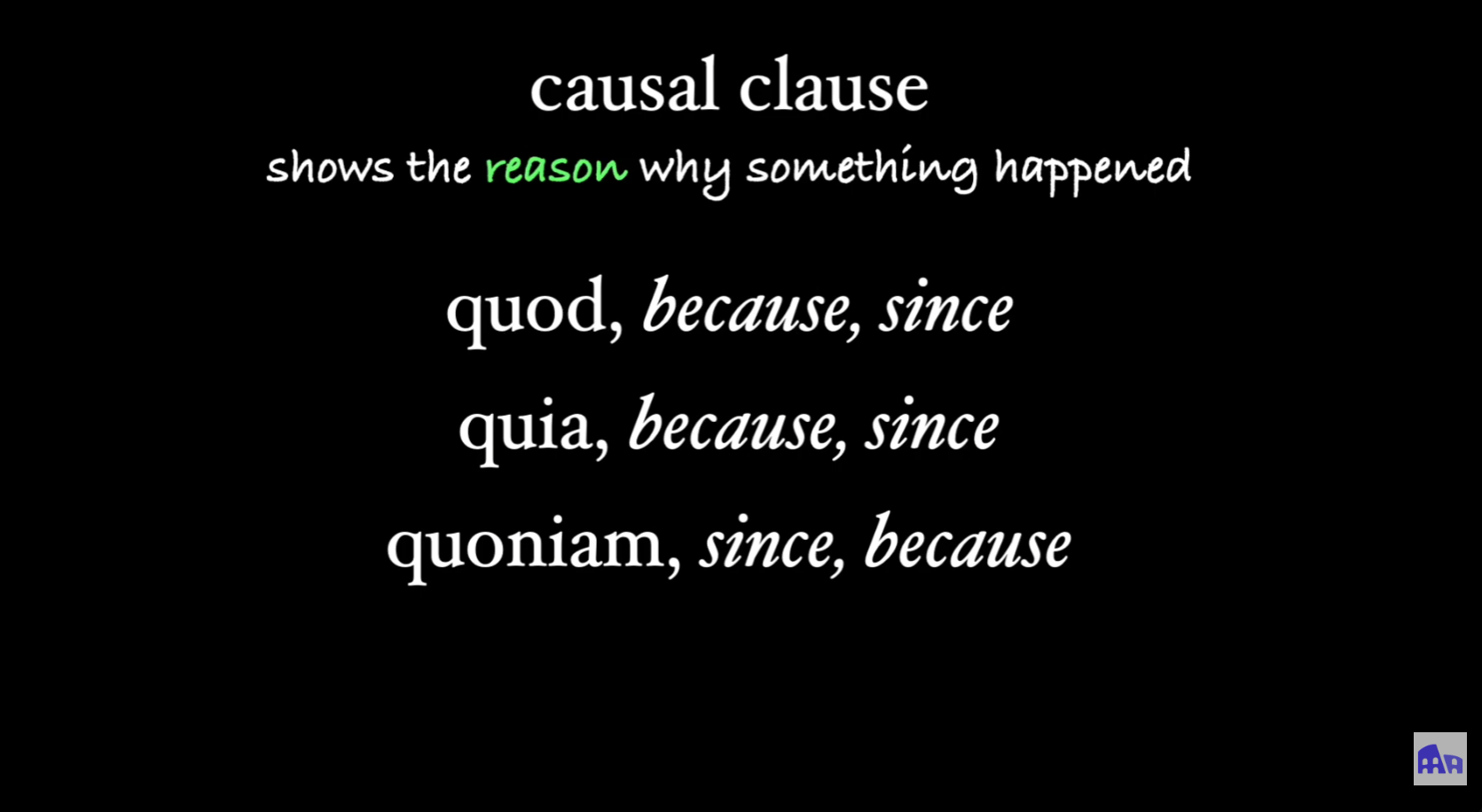
Causal clause (moods
Can be indicative or subunctive
quoniam - used with indicative mood
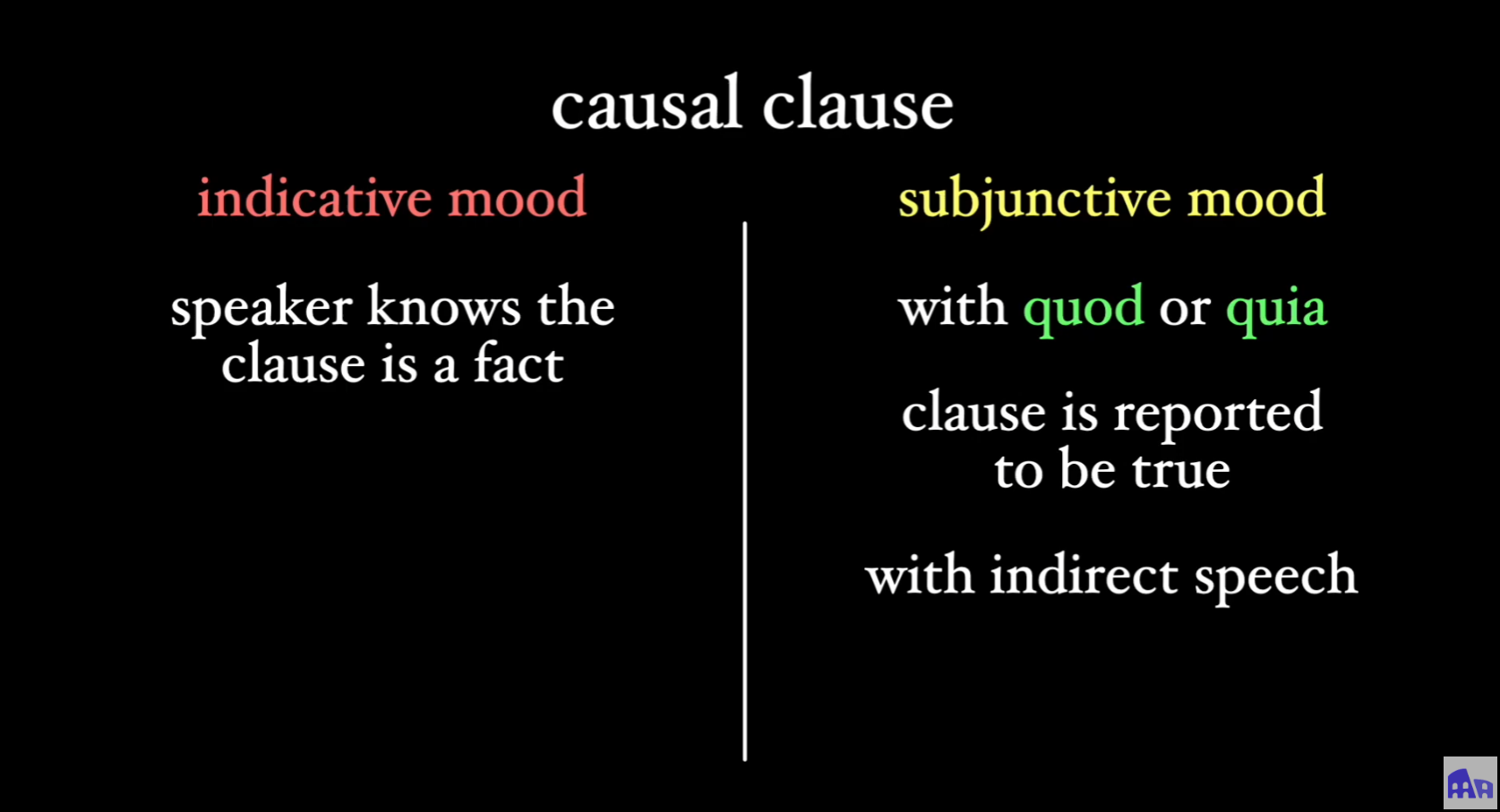
Proviso Clause
A clause using dum, modo and dummodo
Translated as “provided” or “As long as” (for dum, modo)
e.g. Provided that/As long as they are here, we are safe
Take the subjunctive verb
Example
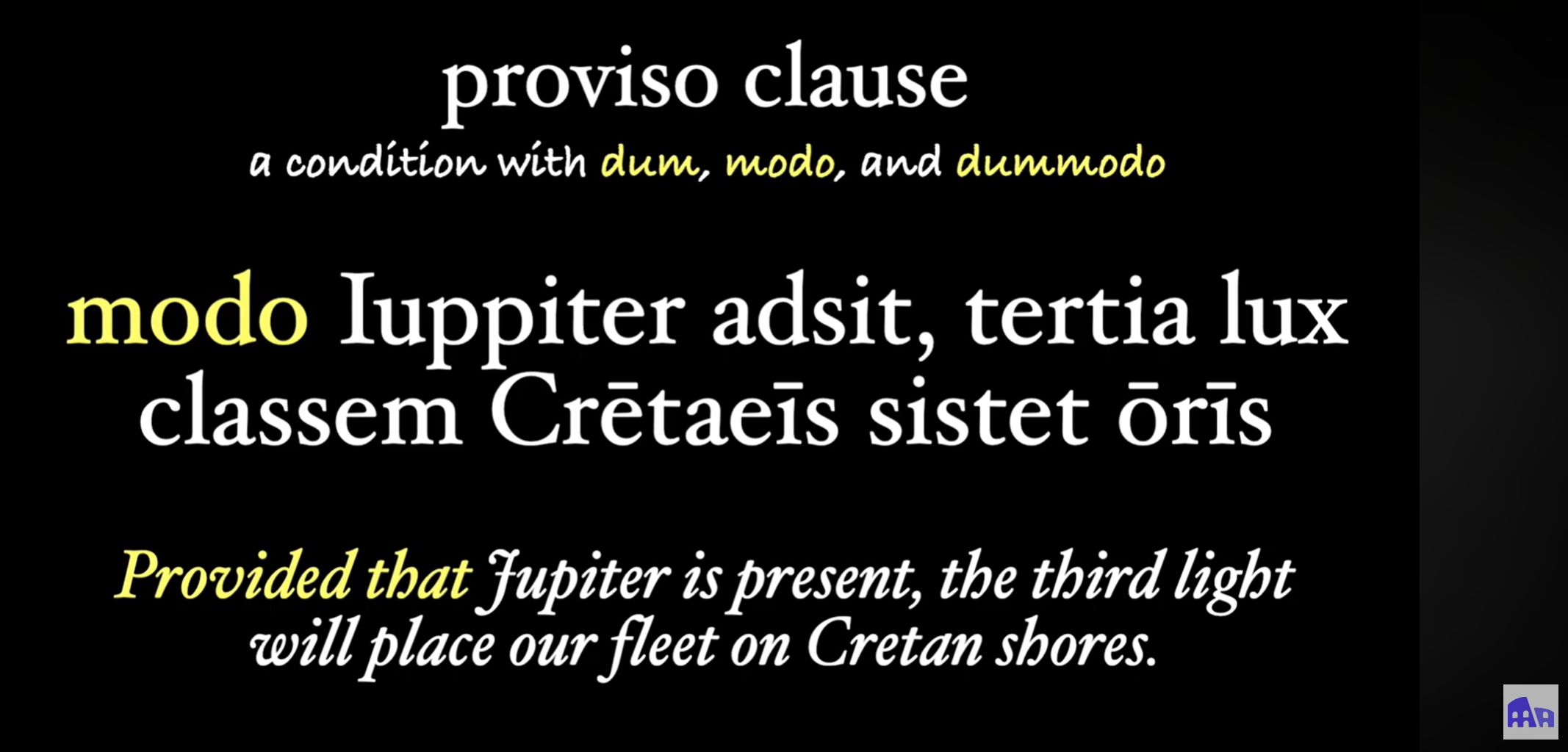
Negative of proviso clause
Using “ne” to express a negative
e.g. “Id faciat faciat saepe, dum ne lassus fiat”
Let him do this often, as long as he does not get tired
Temporal Clause
Indicates when something is occuring
But these words all take the indicative mood
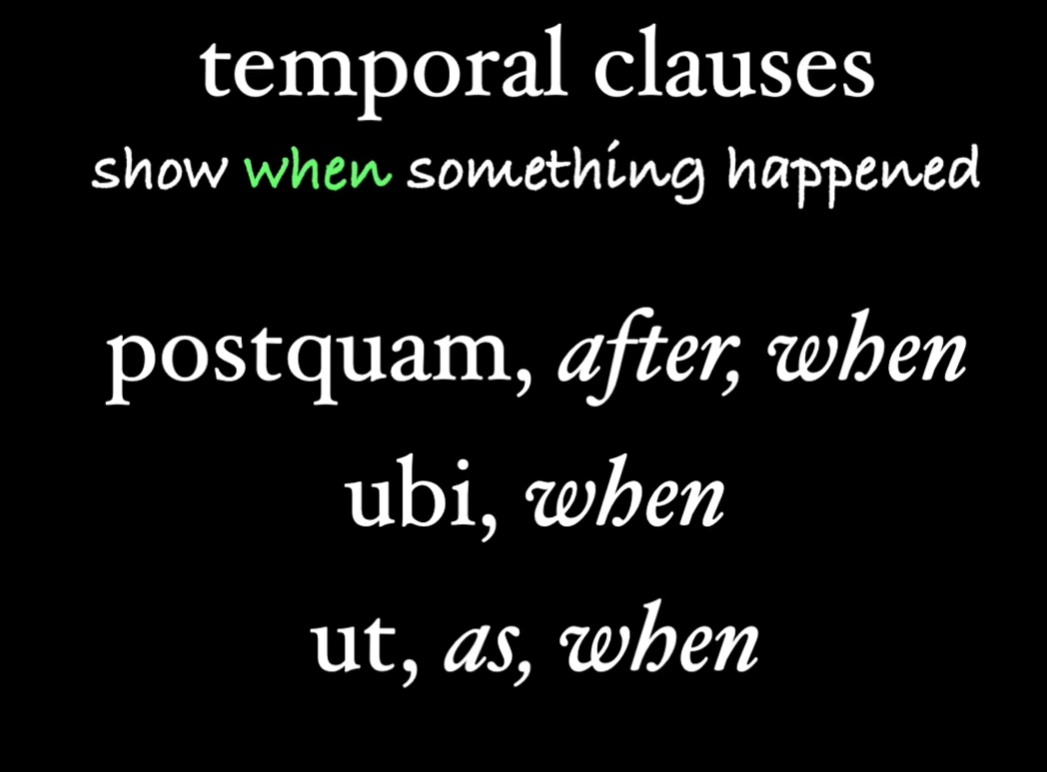
More phrases which signpost a temporal clause
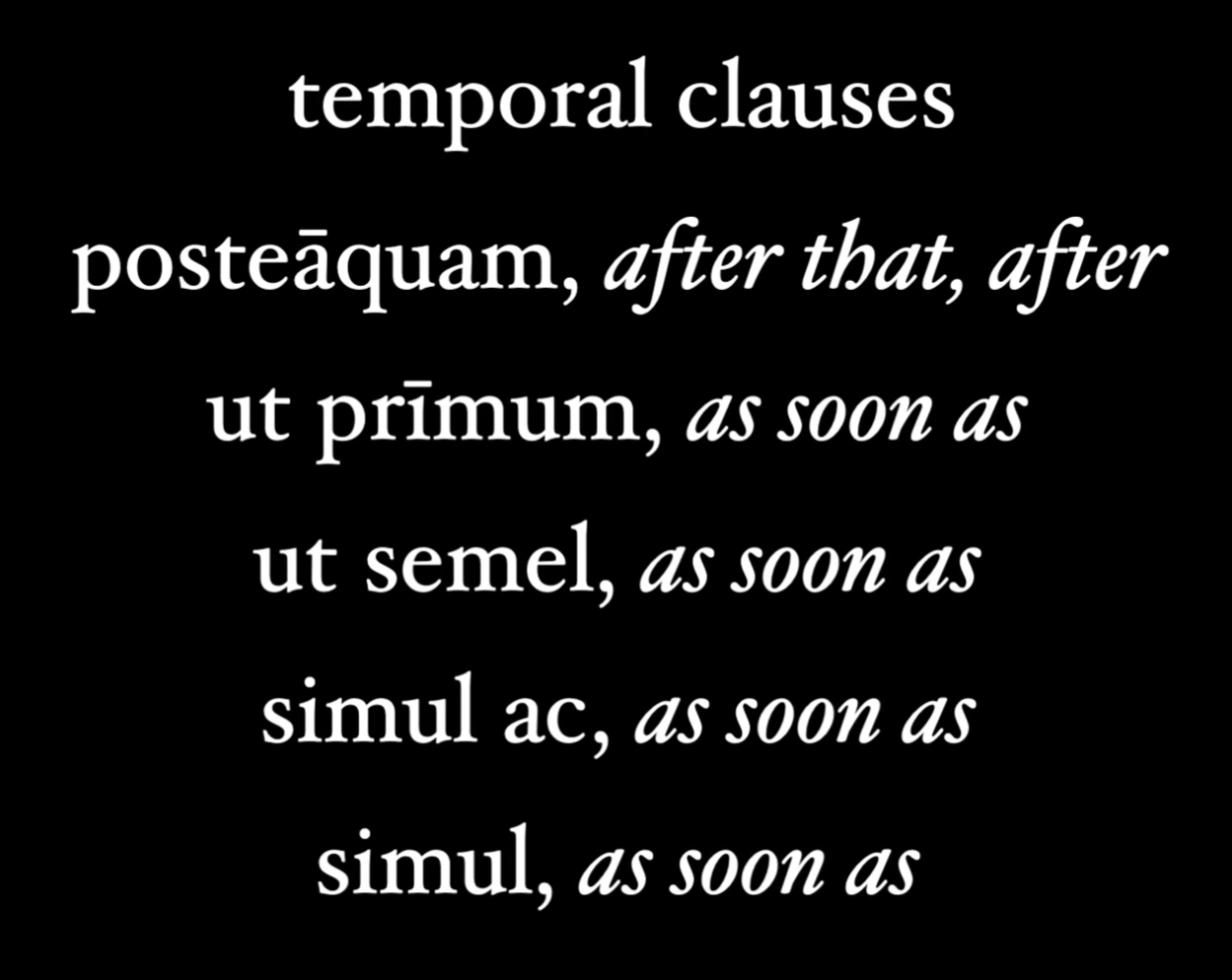
Words of knowing (signposting indirect statments)
rogo, rogare, rogavi – “I ask”
quaero, quaerere, quaesivi – “I ask / seek”
interrogo, interrogare, interrogavi – “I question”
nescio, nescire, nescivi – “I do not know” (often + question word)
miror, mirari, miratus sum – “I wonder”
Words of asking (singposting indirect question)
Words of asking / initiating that trigger an indirect question:
rogo, rogare, rogavi – “I ask”
quaero, quaerere, quaesivi – “I ask / seek”
interrogo, interrogare, interrogavi – “I question”
nescio, nescire, nescivi – “I do not know” (often + question word)
miror, mirari, miratus sum – “I wonder”
Often accompanied by a question word:
quis – who
quid – what
ubi – where
cur – why
quando – when
ut / quomodo – how
Ablative Absolute
Cause (since, because)
Concession (although)
Condition (whether, if)
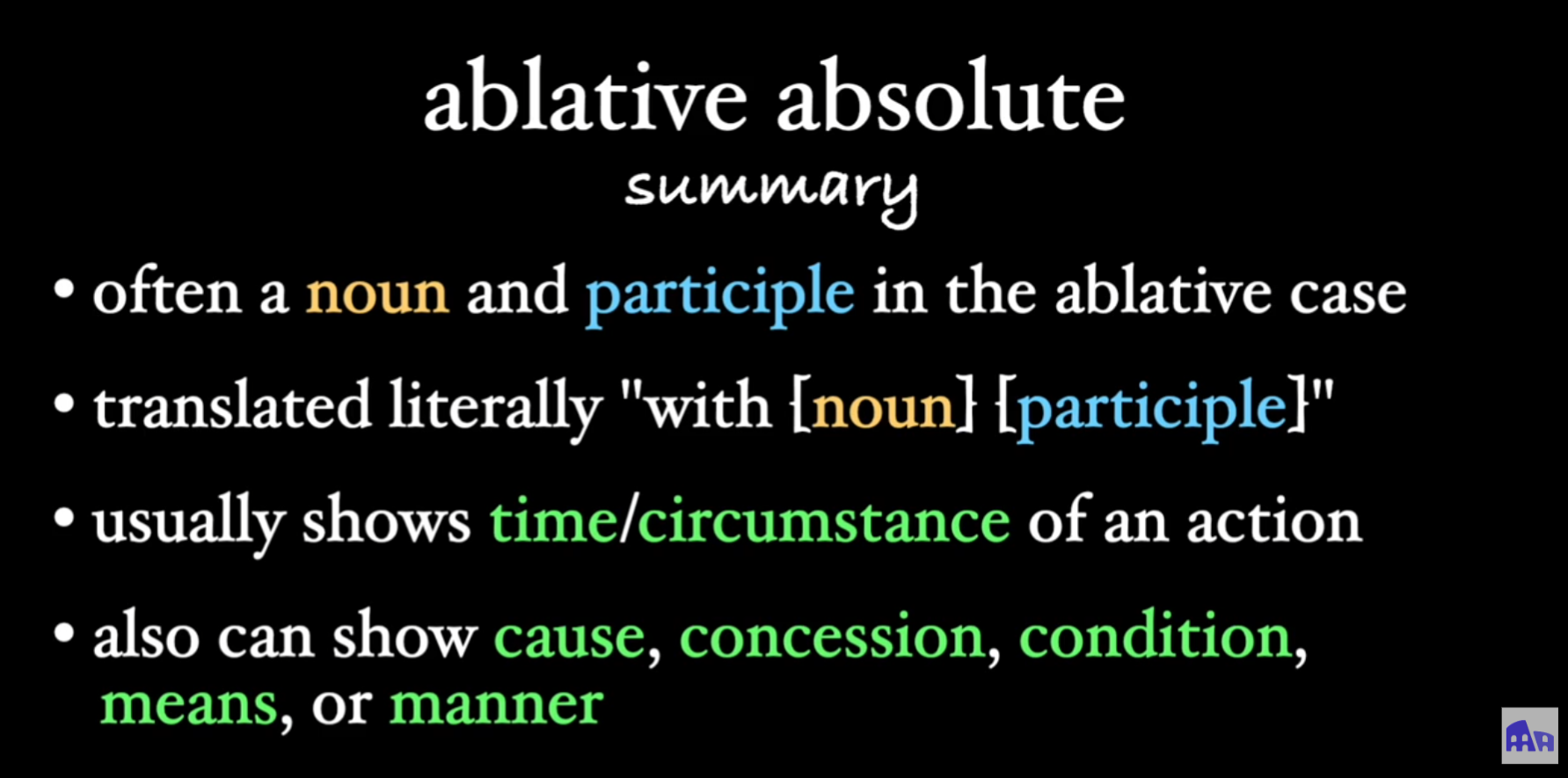
Words that signpost a fearing clause
timeō, timēre, metuō, metuere, vereor, verērī, timor est, metus est, pavor est, terror est, in timōre est, in metū est, pavēo, paveō, exterreo, exterrēre, pertimescō, pertimescere, reformīdō, reformīdāre, timidus, metuēns, terrītus